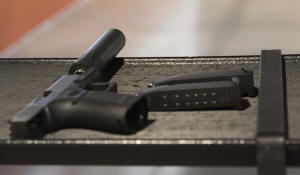GOP tax bill would ease regulations on gun silencers and some rifles and
shotguns
[June 23, 2025]
By MARY CLARE JALONICK
WASHINGTON (AP) — The massive tax and spending cuts package that
President Donald Trump wants on his desk by July 4 would loosen
regulations on gun silencers and certain types of rifles and shotguns,
advancing a longtime priority of the gun industry as Republican leaders
in the House and Senate try to win enough votes to pass the bill.
The guns provision was first requested in the House by Georgia Rep.
Andrew Clyde, a Republican gun store owner who had initially opposed the
larger tax package. The House bill would remove silencers — called
“suppressors” by the gun industry — from a 1930s law that regulates
firearms that are considered the most dangerous, eliminating a $200 tax
while removing a layer of background checks.
The Senate kept the provision on silencers in its version of the bill
and expanded upon it, adding short-barreled, or sawed-off, rifles and
shotguns.
Republicans who have long supported the changes, along with the gun
industry, say the tax infringes on Second Amendment rights. They say
silencers are mostly used by hunters and target shooters for sport.
“Burdensome regulations and unconstitutional taxes shouldn’t stand in
the way of protecting American gun owners’ hearing,” said Clyde, who
owns two gun stores in Georgia and often wears a pin shaped like an
assault rifle on his suit lapel.
Democrats are fighting to stop the provision, which was unveiled days
after two Minnesota state legislators were shot in their homes, as the
bill speeds through the Senate. They argue that loosening regulations on
silencers could make it easier for criminals and active shooters to
conceal their weapons.

“Parents don’t want silencers on their streets, police don’t want
silencers on their streets,” said Senate Democratic leader Chuck
Schumer, D-N.Y.
The gun language has broad support among Republicans and has received
little attention as House Speaker Mike Johnson, R-La., and Senate
Majority Leader John Thune, R-S.D., work to settle differences within
the party on cuts to Medicaid and energy tax credits, among other
issues. But it is just one of hundreds of policy and spending items
included to entice members to vote for the legislation that could have
broad implications if the bill is enacted within weeks, as Trump wants.
Inclusion of the provision is also a sharp turn from the climate in
Washington just three years ago when Democrats, like Republicans now,
controlled Congress and the White House and pushed through bipartisan
gun legislation. The bill increased background checks for some buyers
under the age of 21, made it easier to take firearms from potentially
dangerous people and sent millions of dollars to mental health services
in schools.
Passed in the summer of 2022, just weeks after the shooting of 19
children and two adults at a school in Uvalde, Texas, it was the most
significant legislative response to gun violence in decades.
Three years later, as they try to take advantage of their consolidated
power in Washington, Republicans are packing as many of their longtime
priorities as possible, including the gun legislation, into the massive,
wide-ranging bill that Trump has called “beautiful."
[to top of second column]
|

A handgun with a silencer and two magazines are shown at a gun range
in Atlanta, Jan. 27, 2017. (AP Photo/Lisa Marie Pane, File)

“I’m glad the Senate is joining the House to stand up for the Second
Amendment and our Constitution, and I will continue to fight for
these priorities as the Senate works to pass President Trump’s One
Big Beautiful Bill,” said Texas Sen. John Cornyn, who was one of the
lead negotiators on the bipartisan gun bill in 2022 but is now
facing a primary challenge from the right in his bid for reelection
next year.
If the gun provisions remain in the larger legislation and it is
passed, silencers and the short-barrel rifles and shotguns would
lose an extra layer of regulation that they are subject to under the
National Firearms Act, passed in the 1930s in response to concerns
about mafia violence. They would still be subject to the same
regulations that apply to most other guns — and that includes
possible loopholes that allow some gun buyers to avoid background
checks when guns are sold privately or online.
Larry Keane of the National Shooting Sports Foundation, who supports
the legislation, says changes are aimed at helping target shooters
and hunters protect their hearing. He argues that the use of
silencers in violent crimes is rare. “All it’s ever intended to do
is to reduce the report of the firearm to hearing safe levels,”
Keane says.
Speaking on the floor before the bill passed the House, Rep. Clyde
said the bill restores Second Amendment rights from “over 90 years
of draconian taxes.” Clyde said Johnson included his legislation in
the larger bill “with the purest of motive.”
“Who asked for it? I asked,” said Clyde, who ultimately voted for
the bill after the gun silencer provision was added.
Clyde was responding to Rep. Maxwell Frost, a 28-year-old Florida
Democrat, who went to the floor and demanded to know who was
responsible for the gun provision. Frost, who was a gun-control
activist before being elected to Congress, called himself a member
of the “mass shooting generation” and said the bill would help “gun
manufacturers make more money off the death of children and our
people.”
Among other concerns, control advocates say less regulation for
silencers could make it harder for law enforcement to stop an active
shooter.
“There’s a reason silencers have been regulated for nearly a
century: They make it much harder for law enforcement and bystanders
to react quickly to gunshots,” said John Feinblatt, president of
Everytown for Gun Safety.
Schumer and other Democrats are trying to convince the Senate
parliamentarian to drop the language as she reviews the bill for
policy provisions that aren’t budget-related.
“Senate Democrats will fight this provision at the parliamentary
level and every other level with everything we’ve got,” Schumer said
earlier this month.
All contents © copyright 2025 Associated Press. All rights reserved
 |